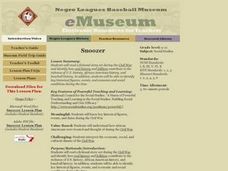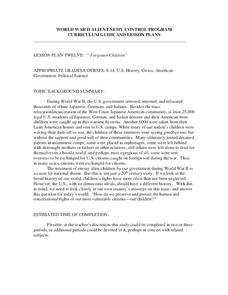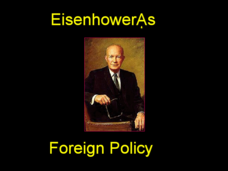Curated OER
The Gettysburg Address: An American Treasure
Learners apply information found in Lincoln's speeches, especially The Gettysburg Address, to create a persuasive speech on a current topic.
Curated OER
Snoozer
Students read a fictional story set during the Civil War and identify how oral history and folklore contribute to the richness of U.S. history, African American history, and baseball history.
Curated OER
World War II Alien Enemy Control Program
Students become familiar with the concepts of human rights and constitutional rights. They have an increased awareness of the historical record as to the cessation of these rights, especially in regards to children during WWII. It is...
Curated OER
Government: War Powers Limitations
Students examine historic examples of authority during wartime. They interpret the Fifth Amendment. They debate the merits of the Patriot Act.
Curated OER
Abraham Lincoln and the U.S. Constitution
Young scholars investigate President Abraham Lincoln's use of the U.S. Constitution and its importance to the Civil War. In this US history lesson plan, students read text about President Lincoln and the US Constitution. Young scholars...
Stanford University
Reconstruction Structured Academic Controversy (SAC)
Young scholars debate whether African Americans were free during Reconstruction. In this debate instructional activity, students use primary documents to support their argument as to whether African American were free during the...
Curated OER
Whose Side Are You On?
Students role play, persuading and staying neutral during arguments. In this viewpoint instructional activity, students examine the viewpoints of soldiers in the Spanish-American War and role play. After a discussion, some students try...
Curated OER
Lift Every Voice and Sing
Students analyze sculpture, poetry, and music to gain an understanding of historical events. In this critical thinking skills lesson, students take a closer look at African-American history as they examine "Lift Every Voice and Sing'"...
Curated OER
Encountering Very Different Ways of Life
Students explore the concept of crossing cultures. They examine how Americans may be viewed by people in another culture and discover that that Peace Corps Volunteers are trained to cross cultures respectfully so that they are accepted...
Curated OER
The Homestead Act
Eighth graders analyze the Native American's viewpoint of the Homestead Act. Using one Native American group who lived in Nebraska, they write a letter to the editor of a local newspaper discussing the Homestead Act and how it affected...
Curated OER
Confict, Consensus, and Conclusion
Young scholars debate the key issues dealing with women's rights and the rights of African Americans during and after the Civil War. They analyze the women's rights movement in relationship to the desire for suffrage. They utilize the...
Curated OER
Lincoln, the Great Emancipator?
Students examine the motivating factors that prompted Lincoln to draft the Emancipation Proclamation in 1863. They examine Lincoln's social and political beliefs, particularly as they pertained to slavery and race in the United States.
CHPCS
The United States in the 1920s: The New Negro Movement and the Harlem Renaissance
Music, writing, and activism all tell the story of history! The resource uses these elements and more in a presentation to discuss the Jazz Age and Harlem Renaissance. Your class views biographies, discusses important events, and...
Historical Thinking Matters
Rosa Parks: 5 Day Lesson
What led to the success of the Montgomery Bus Boycott, and how might historians approach this question differently? This rich series of lessons includes a short introductory video clip, analysis of six primary source documents, and...
University of Arkansas
Promises Denied
"Promises Denied," the second instructional activity in a unit that asks learners to consider the responsibilities individuals have to uphold human rights, looks at documents that illustrate the difficulty the US has had trying to live...
PBS
The Sixties: Dylan Plugs in and Sells Out
Before Woodstock, there was Newport. Get plugged in to the social changes of the 1960s with a lesson that looks at Bob Dylan's performance at the 1965 Newport Folk Festival as a symbol of the radical changes that marked the era.
Scholastic
The Rise of Railroads: California
Railways are an integral part of the history of California. Using a timeline format, class members connect major historical events to the rise of the railroads and their impact on the state. Activities include a mix of independent and...
Curated OER
Sunken Millions: The Way West
Recover sunken treasure with this interactive PowerPoint! Break your class into two teams: the divers and the surfers. They'll work together to answer 20 multiple choice questions, reviewing major events that occurred during the 1800s....
Curated OER
Eisenhower's Foreign Policy
Good for setting the context for 20th century foreign policy issues, these slides describe key points in Latin America, the Middle East, the Far East, and Europe. US or World History classes will appreciate the concise list on each...
Curated OER
Perspective on the Slave Narrative
High schoolers examine narratives of two slaves: iam W. Brown and Frederick Douglas. They produce an essay explaining how Brown's narrative challenged the prejudices of readers in his own time and how it challenges prejudices today.
Core Knowledge Foundation
Volume 2 - A History of the United States: Modern Times—Late 1800s to the 2000s
The second volume of the Core Knowledge History of the United States ebook begins by asking young scholars to consider the impact immigration, industrialization, and urbanization had on the United States in the late 1800s. The text ends...
Curated OER
Human Rights and Discrimination
Fifth graders create a KWL chart on discrimination and human rights. While reading different stories, they take notes on each character in the books. To end the lesson, they discuss the forms of discrimination today and how African...
Curated OER
Tolerance in Times of Trial
Students view the treatment of people of Japanese and German descent during World War II. They explore the problems in assigning blame to populations during times of war. They identify modern examples of discrimination and stereotyping.
Curated OER
Abraham Lincoln
In this biography worksheet, students read a one page factual story about Abraham Lincoln. Students then answer 7 questions about the story.

























